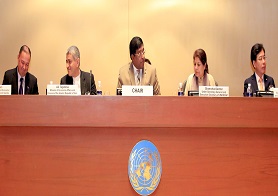 Asia Pacific nations recognized Sri Lankan government for its policies on sustainable development at the 4th High Level Dialogue of the United Nations Economic and Social Commission for Asia and Pacific (ESCAP) held in Bangkok, Thailand on April 28.
Asia Pacific nations recognized Sri Lankan government for its policies on sustainable development at the 4th High Level Dialogue of the United Nations Economic and Social Commission for Asia and Pacific (ESCAP) held in Bangkok, Thailand on April 28.The Keynote address of the conference which was held on April 28 was delivered by Finance Minister Ravi Karunanayake.
All member nations in Asia and the Pacific region of the United Nations Economic and Social Commission for Asia and Pacific (ESCAP) represented their economic and financial sectors in this conference. Finance Minister Ravi Karunanayake was elected as the chairman of the conference. It is significant that the member nations of the region recognized Sri Lanka for her polices on financial disciplines and transparency.
Delivering the Keynote address, Finance Minister Ravi Karunanayake said that Sri Lanka has embarked on a new journey towards sustainable development thereby intending to pass on the benefits equally to every citizen in the country.
Finance Minister Ravi Karunanayake said in his speech that the population in the region is ageing faster than its growth of development therefore necessary infrastructure should be put in place to meet the demand by ageing population in the future.
Addressing the conference, the Finance Minister further said:
“Asia and the Pacific is the most disaster-prone region in the world. Between 1970 and 2014, the region has been affected by more than 5,223 natural disasters according to ESCAP Statistics, and that was 43% of the globally reported disasters. Further, more than 6 billion people in the region were affected by natural disasters accounting for 89% of the global total.
Natural disasters cause loss of lives as well as massive financial losses. Asia and the Pacific alone reported economic losses amounting to almost US dollars 1.22 trillion for this, or 44% of the global total. During the past 10 years alone, climate related disasters in Asia and the Pacific caused damages of US Dollars 367 billion, resulted in the death of nearly 300,000 people, and a total of 1.37 billion people were affected.
Sri Lanka is going through a remarkable transition today powered by a well-crafted medium-term macroeconomic policy framework. Sri Lanka now has a peaceful environment to do business after ending three-decade long separatist movement. But as the new government took office in January 2015 we had to tackle an array of challenges from many fronts.
Our policy is focused towards developing the country containing broad policies of national importance that will assist the achievement of the far reaching reforms. For instance, my theme for the National Budget 2017 was ‘Accelerated growth with social inclusion’, which placed great emphasis on the alleviation of poverty in all manifestations beginning 2017. Social inclusion is a matter of prime concern and the participation of the entire population in the journey for development is a noble objective being 'a society for all'. Such efforts will lay tremendous emphasis on social inclusion and sustainability in economic development, a commitment to achieve the United Nations proclaimed UN Sustainable Development Goals by 2030 ensuring shelter, safe drinking water and improved living standards for all.
I wish to note that while the government is strongly committed to ensuring growth with social inclusion, the fiscal space remains constrained with historically low revenues of around 10-12% of GDP. Thus in the last two years in particular, significant emphasis has been placed on increasing revenue to augment the revenue to GDP ratio to at least 15-17% in the medium term. As such, measures have been taken to broaden the tax base through elimination of exemptions. We will also be introducing a new Inland Revenue Act, which has a simplified tax code and it is expected to facilitate better administration and compliance. At the same time, the introduction of Revenue Administration Management Information System (RAMIS) which connects the three revenue institutions with 27 other entities is also expected to generate better efficiencies in revenue collection. The Department of Customs and Excise also has seen structural improvements been introduced.
Our government is working towards encouraging more private sector participation in the equity markets through major reforms which are centered on the introduction of a new Securities and Exchange Act and the Demutualization of the Colombo Stock Exchange (CSE) which is still a member-owned entity. This is expected to create better accountability and confidence amongst the investor community.
It is now abundantly clear that options for financing infrastructure may greatly depend on the medium-term economic outlook and potential ‘headwinds’ that we may encounter in the global economic environment. In this backdrop, debt-fueled infrastructure development and economic growth may not be a viable option. Hence, the question we all would have to engage in is how governments could unlock any fiscal space for infrastructure spending and other funding requirement for development.
I believe that one of the fundamental challenges for the Asia-Pacific economies, in the medium-term, will be to increase revenue generation. Advanced economies in particular have a long history of using taxes and government spending to smoothen business cycles. If not properly designed and implemented, taxes can harm growth because they distort economic incentives and behavior.
It is noteworthy to consider that the Asia-Pacific region accounts for nearly 40 per cent of global illicit financial outflows including tax evasion which was the largest share on a regional basis. The efforts have been initiated since 1970 to implement regional cooperative frameworks for tax administration in Asia Pacific with the establishment of the Study Group on Asian Tax Administration and Research (SGATAR).
We are seeing an increase in the private participation in infrastructure development, attracted by rising demand for quality infrastructure and expectations of high returns. This has been made possible through different variations of public-private partnerships (PPPs) in the region. So, PPPs have emerged as a viable procurement method for infrastructure development in the region. We ought to implement PPP related reforms such as enacting PPP laws, streamlining PPP procurement and bidding processes, introducing dispute resolution mechanisms, and establishing independent PPP government units”.
General Secretary to UN ESCAP Mrs. Shamshad Akthar, Sri Lankan Ambassador to Thailand Kshenuka Senevirathna, Deputy Treasury Secretaries S.R. Attygalle and Chandra Ekanayake, Assistant Governor Central bank of Sri lanka K.D. Ranasinghe, Economic Research Director Dr. P.K.G Harischandra also participated.




